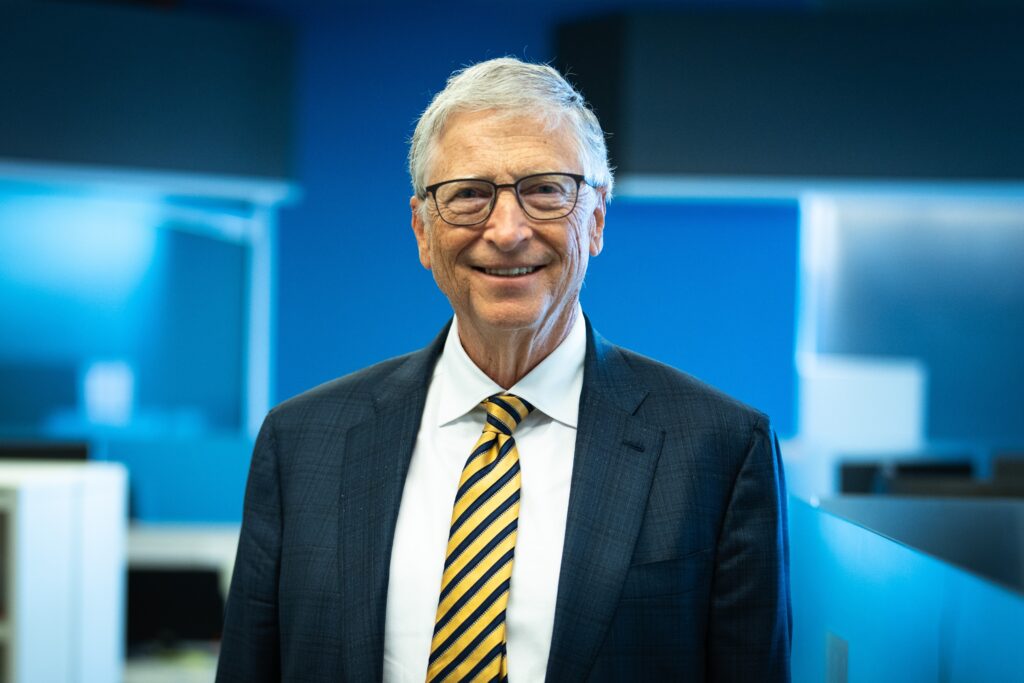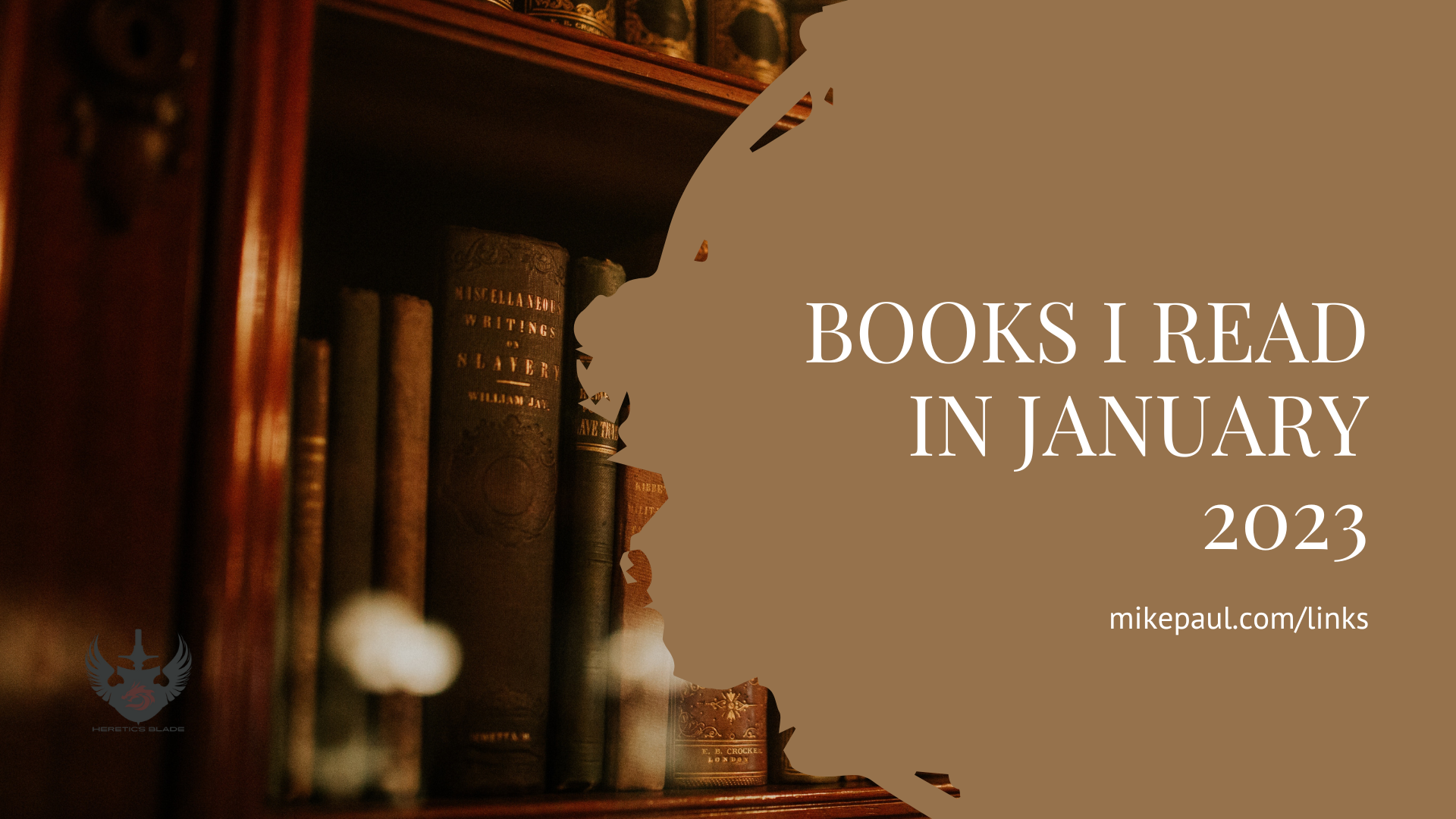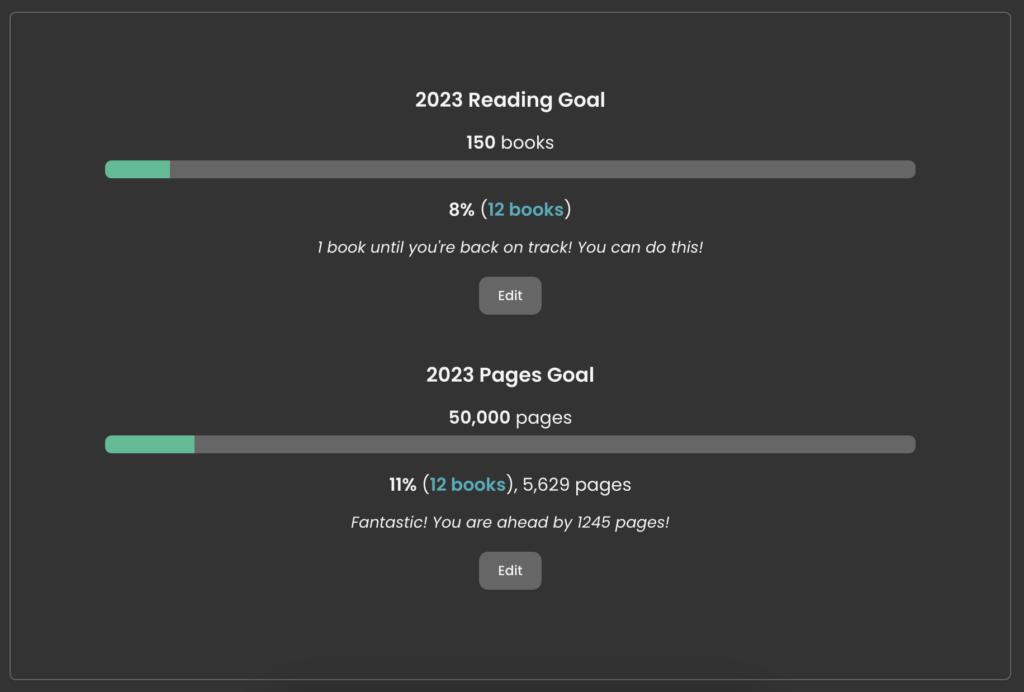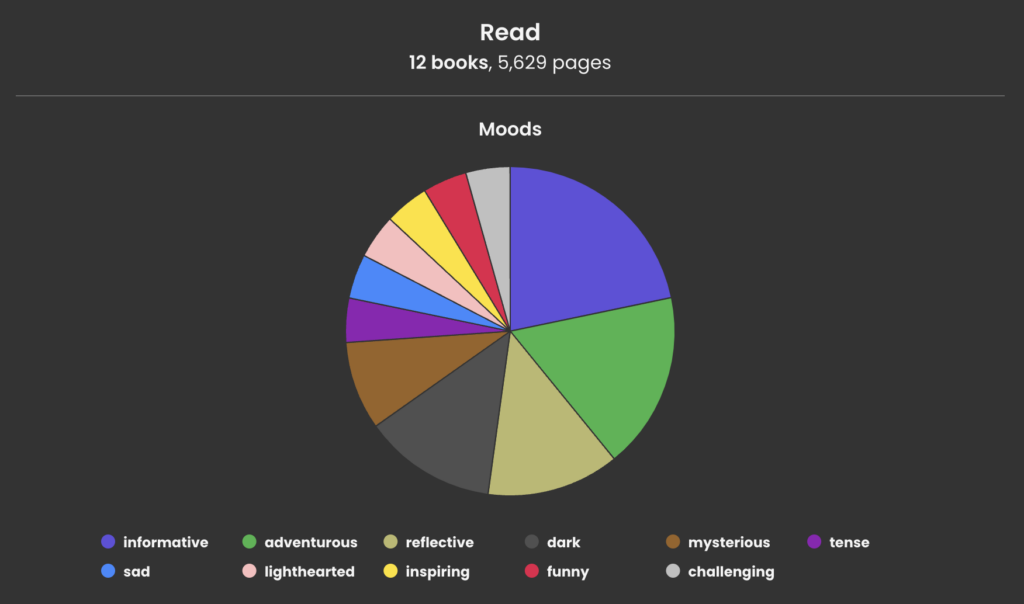Good grief. Somehow, we’ve already burned through the first month of 2023. My year started with a bang with several projects at work with my teaching fellowship and with a new round of doctoral classes. Time is just flying by! I’m grateful for the opportunities, but sometimes it feels like there’s not enough time in the day. Does anyone else feel like this? How do you all manage your time? I’ll share some of my best tactics to save time and organize my days later this month.
For now, let’s dig into the books I read in January 2023. This month’s books include fiction and non-fiction titles. Two of these books are specific to my doctoral classes and, as such, won’t be far from my desk for the rest of this semester. One of the books is the first of Brandon Sanderson’s “Secret Projects,” unveiled last year as part of the most successful Kickstarter ever.
But first, here are some stats from my StoryGraph for the month of January 2023:
And now… TO THE BOOKS!
Tress of the Emerald Sea
No products found.
The first book of the year for me arrived in my inbox at midnight, mountain time. Which means I was fast asleep when it showed up! However, bright and early on the morning of January 1, I sent the ebook to my Kindle (my physical copy will arrive soon enough) and dove in.
The wait was long, and I did my very best to avoid pretty much any plot points or even commentary Sanderson provided before the launch.
The wait was well worth it. What a joy this book was to read. I smiled while reading for probably over half of the book. And at the end, I reveled in the warm, fuzzy feeling of an instant favorite and classic. I haven’t finished all of Sanderson’s Cosmere books yet (that’s one of my goals for 2023), but this one is currently in my top three books, right behind Oathbringer and The Hero of Ages.
If you’re a Sanderson fan, this is a must-read. If you’re not yet a Sanderson fan, dive in this year. This book will be waiting for you when you’re ready.
2001: A Space Odyssey
No products found.
I’m a big fan of science fiction, so I was especially looking forward to reading 2001: A Space Odyssey. I knew it was a classic, and I was excited to see how the world-renowned movie adaptation compared to the book. I’ve seen the movie several times but never read the book.
Unlike other film adaptations, this novel was written right alongside the development of the film. Stanley Kubrick (the director) and Arthur Clarke (the writer) worked together through the process, each getting the writing credit for the film and book, respectively.
The novel did not disappoint. It is an absolute masterpiece and a classic in the science fiction genre. The story is gripping and thoughtful, the setting is unique and captivating, and the characters are well-developed and memorable.
What’s remarkable about the book is how different it is from the movie. While the movie does a great job of conveying the overall plot and has magnificent visuals, it lacks the nuanced details that make the book so compelling. The book provides greater detail and helps define the scope of the themes in the film masterfully.
Overall, I highly recommend this book to any fan of science fiction. It’s an incredible piece of literature with many interesting and thought-provoking ideas. It’s a must-read for any fan of the genre.
The Great Gatsby
No products found.
Yes, I probably should have read this book before I was 46 years old. Sue me. It was not on the list of required books when I was in high school, so I didn’t read it. My apologies to all fans of the book and all its various adaptations.
First, let’s clear the air. I did not enjoy the book. Not at all.
Even so, I have to say that this is a book worth reading. I respect it for its place in the classics of American literature and the impact it has had over the years.
It brings the glamour of the Jazz age alive and also offers an interesting view of life’s relationship with wealth and power. The novel touches upon themes like ambition and disillusionment, offering up a compelling psychological study of its characters.
While Fitzgerald’s writing style is sometimes criticized for being overly romantic and sentimental, there’s no denying the power of his prose. The Great Gatsby shows that it still has a lot to say about life today. It’s a story of dreams, desires, and consequences that can still be felt many decades later.
Oliver Twist
No products found.
This was not my first time reading Oliver Twist. I love Dickens’s novels. Love them. This time, I listened to an audio dramatization of the novel that was stunning. It was incredibly well-acted, and the music and sound effects added to the story’s intensity.
The novel follows the adventures of Oliver Twist, an orphan in London who is tossed from one misfortunate situation to another. It’s full of incredible characters like Fagin and Bill Sykes, as well as moments of heartbreak and suffering.
It’s a timeless story that shows the power of hope, even in the darkest of times. It may be set in Victorian England, but its themes of poverty and injustice still resonate today. It is an inspiring reminder to always keep on fighting against all odds.
Elantris
No products found.
After reading a large chunk of the Cosmere novels, I finally went back to “the beginning” of sorts. Elantris is Brandon Sanderson’s first published novel but the sixth one he wrote. Elantris takes place in a world of magic and wonder, but it’s also filled with tragedy, loss, and pain.
As others have pointed out, Sanderson’s writing has improved greatly since Elantris’ publication. However, the book is still fantastic and gives hints of much of the Cosmere awesomeness to come.
Sanderson has said that he will write sequels to Elantris in the future, and I’m looking forward to how they will tie into the larger Cosmere universe.
Stalking the Nightmare
No products found.
Harlan Freaking Ellison. I think this is my third time reading this collection of stories from the Grand Master of speculative fiction. Stalking the Nightmare is an amazing read every time, as are all of Ellison’s collections.
Ellison grabs you by the throat with his prose and doesn’t let go, not ever. His stories are intense, heart-wrenching, and full of emotion. If you haven’t read this book yet, I highly recommend it for its exploration of themes like mortality, identity, morality, creativity, and the endless cycle of tragedy, loss, and pain.
I’m thrilled that author J Michael Straczynski is working to get all of Ellison’s works republished and finally get the anthology “The Last Dangerous Visions” published.
To be sure, Ellison can be problematic, and he certainly was not a great person to work with at any time. But his contributions to speculative fiction cannot be overlooked.
Reframing Organizations
No products found.
This classic of organizational theory — this is the seventh edition — is one of the books for my doctoral work.
In Reframing Organizations, Bolman and Deal offer a unique perspective on organizations, focusing on four frames: structural, human resources, political and symbolic. They argue that all four frames must be taken into account when looking at the inner workings of an organization.
The book is very accessible and flows well, making it easy to understand even for those with little background in organizational theory. This update includes examples from more recent organizational leadership scenarios, including commentary on the Trump presidency.
Mixed Methods Applications in Action Research
No products found.
The second book for this semester’s doctoral studies, this book goes into incredible detail about creating a mixed methods action research project.
Of course, it is primarily a handbook for budding researchers and not a captivating read. However, if you’re curious about the mixed methods action research methodology, you may want to add this to your reference library.
The Prestige
No products found.
I have a unique connection to the film version of “The Prestige.” My grandfather passed away on the morning of Halloween in 2006. To help take my mind off that incredible loss, my girlfriend (now my wife) and I went to the movies and saw “The Prestige.”
I have loved the film ever since.
Whether I knew about it and forgot or just never knew, I didn’t realize the film was based on a novel. As soon as I did, I picked it up and dove in.
While the film for me is more enjoyable than the novel, the novel does bring a different perspective to the events and the characters. Altogether a fine read.
Deep Work
No products found.
Cal Newport defines “deep work” as focused, uninterrupted, undistracted work on a task that pushes your cognitive abilities to their limit.
In comparison, “shallow work” means tasks that don’t need much thinking – like answering emails, doing paperwork, and going to unproductive meetings. These tasks don’t give much value, and anyone can do them.
Newport argues that developing new concepts and achieving great results requires deep work, not shallow work. Shallow work is small and incremental, whereas deep work can be life-changing.
Now, as an educator in the K-12 sector, much of what Newport outlines here with time blocking and other techniques don’t translate well to the daily life of a teacher.
However, there is still much to learn and apply here, we have to modify for our work.
For example, rather than blocking off large chunks of time to focus on a single task, teachers can look at ways to make the most efficient use of their limited time.
This could include carving out shorter periods for deep work focused on planning or assessment and using the rest of their day for shallow tasks like grading papers or completing administrative duties.
Overall, Deep Work is a great read for anyone looking to maximize their productivity.
Peak
No products found.
Peak: Secrets From the New Science of Expertise looks at how people gain skills and how top performers in music, sports, and other areas grow their abilities. It may appear that people such as Chopin, Beethoven, or Roger Federer have a natural gift that allows them to do amazing things without hard work, but in fact, they put in a lot of effort.
The book discusses that, as your skills improve, you will come to a point that will cause you to change how you “practice” that skill to see greater improvement. The process involves moving from “purposeful practice,” a process involving setting specific goals, getting feedback, and stepping outside of your comfort zone, to “deliberate practice,” which builds on the principles of purposeful practice but applies them in a systematic, rigorous framework that leads to the kind of performances we see from acknowledged experts.
Think about all we do in our schools. Not just what our students do as part of the learning process but what we do as teachers improving our practice. By embracing the principles of deliberate practice and applying them to every, we could create a far better world, one with profound implications for technology, healthcare, public service, and countless other fields.
On War
No products found.
I know, I know. You’re thinking to yourself, “why is an educator reading a book on war strategies?”
I get it, this is probably not the book you would find on most teachers’ bookshelves. However, as someone who wants to make significant changes in the educational system, I think that any strategy I can find to help me in that “war” will be helpful.
On War by Carl von Clausewitz is arguably the most influential Western treatise on the subject of war. Clausewitz was a Prussian general who fought in the Napoleonic wars in the early 1800s, and he wrote extensively about military philosophy, strategy, and tactics.
The book consists of a large collection of essays. The author intended to develop them into a comprehensive textbook for military officers, politicians, and others who needed to understand the subject of war. However, he died before finishing this project, so his writings were published in their original form.
Again, I have no intentions of going to war. But, as educators, we are continually involved in political battles, and having some strategies to keep in mind as we participate in those battles is not a bad thing.
Conclusion
Overall, January was a great reading month. I stayed in line with my reading goals for the year and knocked off several books that have been lounging on my TBR for a long, long time.
Of course, I’ll continue to recommend books that I think are great for teachers and other leaders each and every month. If you’re interested, I publish a monthly book recommendation newsletter with 5-10 books I think you’ll love.
If you haven’t already, consider signing up for my Read With Mike monthly newsletter. I’m sure you’ll enjoy getting great reading recommendations each month for free.

















